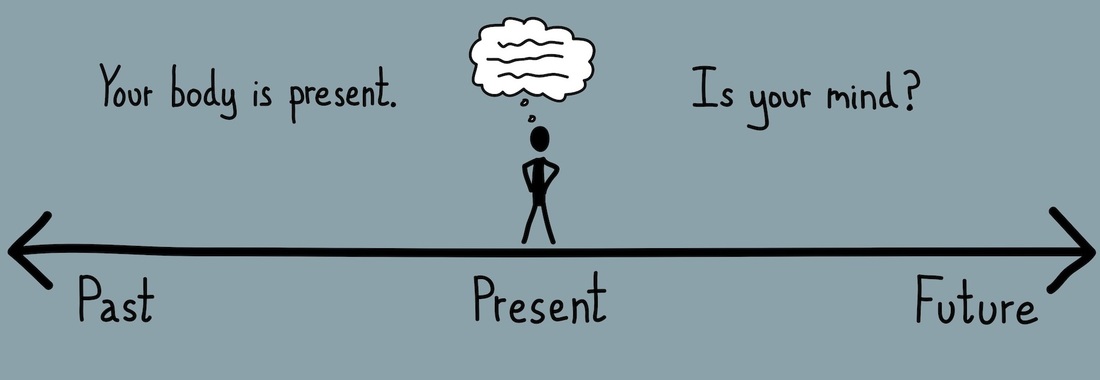|
Mindfulness is the observation of consciousness in the present moment, it is the awareness of present experience without interference, it is "the non-judgemental observation of the ongoing stream of internal and external stimuli as they arise" (Baer 2003, p. 125).
What is Mindfulness? What are the benefits of practising Mindfulness? What can it do to enhance psychological well being? Mindfulness is a very popular term that is used frequently in today’s society, but what is it? Mindfulness practice focuses on developing and cultivating moment by moment attention by practicing present moment awareness of thoughts, emotions, sensations and their movement with acceptance, non-judgement and compassion. It is focusing on being rather than doing. What happens when you bring your full attention and awareness? You more fully experience and enjoy YOUR life. You learn to let go of thoughts of the past and future and become fully present in the here and now. In a world filled with distractions, technology and a time driven society life can become an automatic, stressful experience. The mind is programmed to be busy and is constantly over stimulated this creates enormous stress in the body and mind which can lead to anxiety, depression and other physical and mental ailments. In the present moment we can access peace, relaxation, awareness and gratitude. This course will take you through five weeks of meditation practices that will train your attention and awareness allowing you to access greater control over your bodily sensations, thoughts, feelings and day to day environment, thus helping you reduce the amount of stress in your life. Mindfulness can enhance the quality of your life and your mental and physical well being. Mindfulness practice has been shown to positively affect mood (Chambers et al 2008), reduce stress and anxiety (Shapiro 2006), help people develop a greater ability to regulate their emotions (Siegel 2007), it has been shown to be an effective practice to reduce depression and psychological distress (Bodhi 2011), it enhances intuition and self-insight, supports immune function, reduces the experience of pain (McKim 2008), it reduces negative rumination (repetitive inner chatter) (Corcoran et al 2010) and creates neuroplasticity (it rewires the brain) (Siegel 2007). Finally it enhances the human capacity for empathy (Anderson 2005) and compassion (Kingsbury 2009). In essence Mindfulness practice is being fully and completely aware of what is happening for you in your experience without judgement in the present moment – it is the art of observing what “is”. That is what is so liberating about Mindfulness. Refs: Baer, R. A. (2003). Mindfulness training as a clinical intervention: A conceptual and empirical review. Clinical Psychology: Science and Practice, 10(2), 125-143. Bloch, L., Moran, E. K., & Kring, A. M. (2010). On the need for conceptual and definitional clarity in emotion regulation research on psychopathology. Emotion Regulation and Psychopathology: A Transdiagnostic Approach to Etiology and Treatment, , 88-104. Bodhi, B. (2011). What does mindfulness really mean? A canonical perspective. Contemporary Buddhism, 12(01), 19-39. Chambers, R., Lo, B. C. Y., & Allen, N. B. (2008). The impact of intensive mindfulness training on attentional control, cognitive style, and affect. Cognitive Therapy and Research, 32(3), 303-322. Davis, D. M., & Hayes, J. A. (2011). What are the benefits of mindfulness? A practice review of psychotherapy-related research. Psychotherapy, 48(2), 198. Kingsbury, E. (2009). The relationship between empathy and mindfulness: Understanding the role of self-compassion. ProQuest Information & Learning. Mckim, R. D. (2008). Rumination as a Mediator of the Effects of Mindfulness: Mindfulness-Based Stress Reduction (MBSR) with a Heterogeneous Community Sample Experiencing Anxiety, Depression, and/or Chronic Pain., Shapiro, S. L., Carlson, L. E., Astin, J. A., & Freedman, B. (2006). Mechanisms of mindfulness. Journal of Clinical Psychology, 62(3), 373-386. Siegel, D. J. (2007). Mindfulness training and neural integration: Differentiation of distinct streams of awareness and the cultivation of well-being. Social Cognitive and Affective Neuroscience, 2(4), 259-263. |
AuthorAnnie O'Brien M.Sc. MIACP MIHA has a Masters Degree in Integrative Counselling and Psychotherapy from Turning Point Institute and Dublin City University. This course is one of the leading training courses in Ireland and is recognised by the Irish Association of Counselling and Psychotherapy (IACP), the Irish Association of Humanistic and Integrative Psychotherapy (IAHIP) and the European Association for Integrative Psychotherapy (EAIP). Archives
June 2019
Categories
All
|

 RSS Feed
RSS Feed